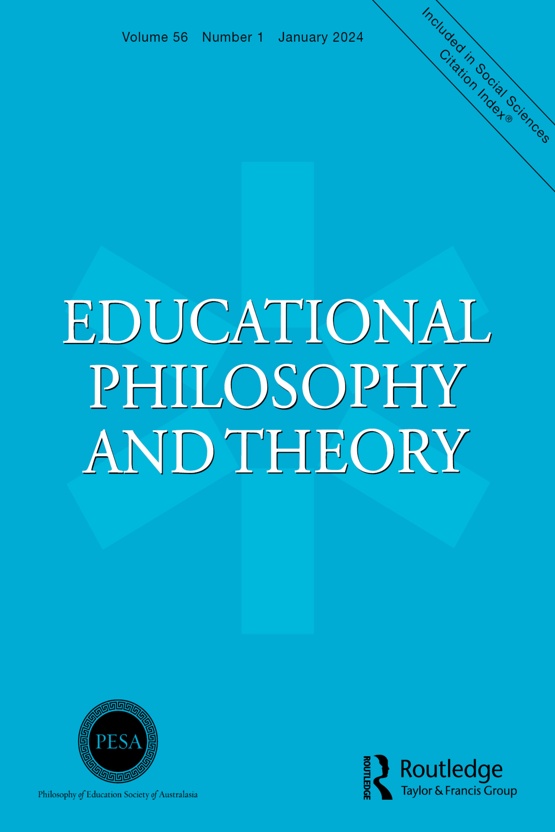Submit a Manuscript to the Journal
Educational Philosophy and Theory
For a Special Issue on
Naturalness and Artificiality in Education: Lessons From Fictional Texts
Abstract deadline
10 July 2024
Manuscript deadline
01 November 2024

Special Issue Editor(s)
Gideon Dishon,
School of Education, Ben-Gurion University of the Negev
[email protected]
Oded Zipory,
Seymour Fox School of Education, Hebrew University of Jerusalem
[email protected]
Naturalness and Artificiality in Education: Lessons From Fictional Texts
It is hard to avoid the recent discussions – characterized by anxiety as well as enthusiasm – about artificial intelligence and its possible effects on society, the market, human creativity, learning and many more, if not all, aspects of life. These hopes and worries have been particularly pronounced in the case of education due to generative AI’s capacities for autonomous writing, an aspect that is at the heart of the aims and means of education. Educational discussions of AI have tended to focus on the potential and dangers of Generative AI in education, from concrete worries concerning plagiarism and the changing skills needed in AI-saturated world, through aspirations that AI could reduce teacher workload and offer more personalized modes of education, to warnings concerning the dangers of the reproduction of bias and the spread of misinformation. Works in Educational Philosophy of Theory have sought to broaden the scope of inquiry, exploring the epistemological and ontological implications of generative AI, as well as how it shapes, and is shaped by, social imaginaries.
In the proposed special issue, we build on these inquiries, aiming to further explore the A part of AI. That is, we wish to better understand what is the ‘artificial’ and what is its relationship with nature, technology, and development. We further ask how and to what extent is education intertwined with artificiality. While education can be considered as natural in the sense that all humans take part in it from an early age, it can also be seen as inherently artificial, as it appeals to intentional and adult-guided modes of learning, especially when carried out in and by schools. In other words, we see the developments in AI technologies as an opportunity to shed light on the connections between education, humanity, artificiality and naturalness. Instead of applying artificiality just to intelligence, we examine whether the artificial can be found in other aspects of education such as learning, character development, morality and more. Even if we stick solely to 'intelligence', we can contemplate its various kinds (emotional, interpersonal, etc.), and ask whether these intelligences can become artificial as well, and what are the effects of such an artificialization.
Critically, this special issue sets out to examine these issues by exploring how artificiality has been imagined and circumscribed in works of fiction: from classical texts of literature, through representations in popular culture, to media or cultural events describing engagement with artificiality (e.g. Pinocchio, Frankenstein, 2001: A Space Odyssey, Matrix). In recent years, works in EPAT have been paying increased attention to the role of literary, cinematic and speculative work in allowing us to think beyond the limits of dominant views, with their common emphasis on a positivistic and economic framing. Fictional narratives are particularly evocative means for circumscribing current engagement with technological developments. Sometimes referred to as myths or imaginaries, narratives offer simple and easily communicated views of technology’s potential and pitfalls. Hence, attending to fictional narratives facilitates a more in-depth understanding of current discourse and allows us to go against market-driven technological determinism, examining how educational technologies could be imagined otherwise. Engagement with fictional texts is uniquely pertinent in the case of AI, which is connected to millennia-old narratives concerning humanities aspiration to, and fears of, creating artificial life.
The special issue will thus contribute to the vivid discussion of AI and, more broadly to efforts on thinking how education should respond to ongoing global crises, focusing on changes in long-standing educational tensions and contradictions considering the emergence of new information technologies. Even more importantly, such discussions are intended to develop EPAT’s ongoing aim of thinking against the grain, examining how AI could make education more humane. To examine artificiality in education, papers will analyze such texts with both literary and traditional philosophical tools. This special issue welcomes texts that can address, but are not limited to, the following topics:
- Fictional representations of artificial intelligence (broadly construed), and their implications for thinking about education
- Literary or cinematic depictions of educational settings that include artificial students, teachers or learning
- The relationship between the natural or human and the artificial in educational practices
- The promises and dangers of artificiality as overcoming human vulnerability
- The possibility of artificial human attributes beyond intelligence (empathy, moral character, etc.)
- Analyses of narratological structures underlying engagement with artificiality in education
- Educational futures made possible by artificial intelligence, and their interplay with dominant and alternative modes of current thinking
Looking to Publish your Research?
Find out how to publish your research open access with Taylor & Francis Group.
Choose open accessSubmission Instructions
Abstracts can be submitted to Gideon Dishon [email protected] no later than July 10th, 2024. Abstracts should be no longer than 500 words plus key references. The proposals should include title of the proposal, authors (including affiliations and email addresses), and 3–5 keywords. They should indicate how the article will address the key themes of the call, the theoretical perspectives, and methods (if applicable) as well as a clear outline of the argument.